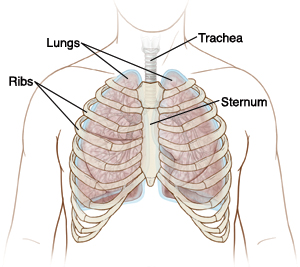Chest Bruise (Contusion)

The chest wall runs from the shoulders to the diaphragm or bottom of the ribs. It includes the front and back of the rib cage. It also includes the breastbone, shoulders, and collarbones. A blunt trauma, such as during a car accident or fall, can injure the chest wall. This injury is called a chest wall bruise (contusion).
Injury to the chest wall may result in pain, tenderness, bruising, and swelling. It may also result in broken ribs and injured muscles. These cause pain, often during breathing. If 1 or more ribs are broken in several areas, the chest wall may become unstable and painful. This may cause serious breathing trouble.
In the emergency room or urgent care center, any broken bones or other injuries will be evaluated. You may be given medicine for pain. Broken ribs often heal without further treatment. Sometimes it's hard to tell if a rib is broken or just bruised. Broken ribs and bruised ribs are often treated the same. A broken shoulder or collarbone may be taped or supported with a sling.
Home care
Follow these guidelines when caring for yourself at home:
-
Rest. Don’t do any heavy lifting or strenuous activity. Don’t do any activity that causes pain.
-
Put an ice pack on the injured area. Do this for 20 minutes every 1 to 2 hours the first day. You can make an ice pack by placing ice cubes in a plastic bag that seals at the top. Wrap the bag in a thin towel. Use the ice pack 3 to 4 times a day for the next 2 days. Then use the ice pack as needed to ease pain and swelling.
-
After 1 to 2 days, you may put a warm compress on the area. Do this for 10 minutes several times a day. A warm compress is a clean cloth that’s damp with warm water.
-
Hold a pillow to the affected area when you cough. This will help ease pain.
-
You may use over-the-counter pain medicine, such as acetaminophen, naproxen, or ibuprofen, to control pain, unless another pain medicine was prescribed. If you have chronic liver or kidney disease, talk with your healthcare provider before using these medicines. Also talk with your provider if you’ve had a stomach ulcer or gastrointestinal bleeding.
Follow-up care
Follow up with your healthcare provider, or as advised.
When to get medical advice
Call your healthcare provider right away if any of these occur:
-
New belly (abdominal) pain that gets worse
-
Fever of 100.4ºF (38ºC) or higher, or as advised by your provider
Call 911
Call 911 if any of the following occur:
-
Dizziness, weakness, or fainting
-
Shortness of breath, trouble breathing, or breathing fast
-
Chest pain gets worse when you breathe
-
Severe pain that comes on suddenly or lasts more than an hour